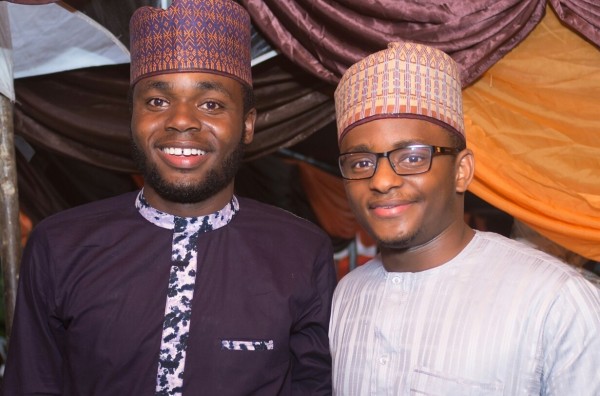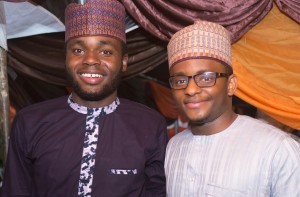It is often said that there are enough entrepreneurial opportunities in Nigeria if you know where to look, and it is also often said that two good heads are better than one.
This is especially true of this duo who teamed up to set up a laundry service business at the University of Ilorin, Kwara State. Connect Nigeria interviewed Yusuf Olanrewaju Ali and Sadiq Wanka, founders of Frisch, to talk about their business and the journey so far.
CN: Tell us a little about yourselves.
YOA: I am 22 years old. I attended Ajoke Model Nursery and Primary School, Illorin, between 1994 and 2002. I then proceeded to Adesoye College Offa and graduated in 2008. After secondary school, I attended Bellerbys College London where I obtained a foundation degree in Engineering. I obtained a BEng degree in Electrical and Electronics Engineering (First class honours) from the University of Manchester in 2012 and an MPhil in Nuclear Energy from the University of Cambridge in 2013. I am currently undertaking a PhD in Energy Policy at the same University.
SW: I am 23 years old. I went to Spring Nursery and Primary School in Kano before proceeding to Adesoye College in 2002. I did my foundation degree at INTO Manchester, before attending the University of Manchester to study Chemical Engineering. I consequently graduated in 2012 with a BEng degree in Chemical Engineering (First Class Honours). I went on to obtain an MPhil degree in Industrial Systems, Manufacturing and Management from the University of Cambridge. I am currently doing my NYSC at the Advisory Division of KPMG Professional Services.
CN: Tell us about Frisch.
YOA: Frisch Laundry Services (FLS) started operations in January 2013. We are located at the University of Ilorin Permanent Site. FLS is a medium scale business committed primarily to the provision of top quality laundry services to university students at affordable prices hence our motto “affordable luxury”. We firmly believe that domestic activities, particularly laundry, take up too much of the students’ non-class time and hence reduces their ability to fully enjoy the total learning experience which the university offers.
CN: What was the motivation for the business, considering that you both did not study this at the University?
SW: I think at the heart of it all is an interest in entrepreneurship and the concomitant independence – financial and otherwise – which a successful business can afford. Once there is that desire to start a business, you are looking for that light bulb moment of realising a business opportunity and ultimately seizing it.
As for starting a business in a university we didn’t attend, bright ideas often emanate from seeing and experiencing a certain product or service elsewhere and then modifying that product or service to suit your target market realities. In our case, laundry facilities are fairly commonplace in student accommodations at universities we attended. It was therefore a matter of adapting that idea to the Nigerian context.
CN: How did you raise capital to set up the business?
YOA: Raising capital was undoubtedly the hardest part of the project. Considering that the idea was conceived in April and then finalised in July with plans to start operations latest by early October, the already arduous task became harder. From the onset, We (the shareholders) knew we were going to need soft parental loans to get the idea off the ground.
I personally had to prepare a scenario workbook for my father in order to convince him that my idea was worth the pretty sizeable loan I wanted him to give me. With the help of God and some serious pitching skills, my co-owners and myself were able to get our parents to grant us the loans we wanted.
CN: What is the most important lesson you have learnt about business so far?
SW: A key lesson we have learnt is that a business idea is great, but it is only a miniscule portion of the greater picture of creating, running and sustaining a business. Secondly, having business partners that can fund an idea is nice, but it is absolutely necessary to also assemble a team that will invest energy in the operation of the business. If you just throw money at any business and leave it in incompetent hands, running on autopilot, it is only a matter of time before the whole enterprise will come down crashing. Finally, business is complex and does not necessarily play out as planned or forecasted. The process of adapting to new information, exigencies and trends while continuously improving current operations is absolutely essential.
CN: What would you do differently if given the chance?
YOA: Unfortunately, hindsight is a luxury we are not afforded in real life. However, the reflective and review processes have been one of the more rewarding parts of this venture so far. I find myself constantly critiquing old methods in a bid to improve customer satisfaction and increase returns on investment for all shareholders.
In an “ideal world”, we would have started our start-up work earlier than we finally did and hence would have begun operation and perfected our in-house logistics well before the students resumed for the 2013-14 academic year. Principally, because we were not done with this start-up work, we started operations at arguably the worst time possible – just before the first semester examinations. This meant we did not have the time or the attention of students that we needed to undertake the massive publicity campaigns that were required to get our name and service out there. We have been playing catch-up on this ever since.
CN: What need were you aiming to fill when you set up Frisch?
SW: The value proposition of Frisch is very straightforward. We want to provide a comprehensive laundry service solution primarily to the UNILORIN family. We are not reinventing the wheel in the sense that students used to wash and iron before we arrived on campus. The convenience we offer in terms of turnaround, our quality of service and tailored packages that are affordable and in tune with the needs of students on campus, represent the gap we sought to close when we decided to start the venture. That is not to say we are set up exclusively to serve students, but that the needs of students are at the very core of our corporate strategy and everything we do at Frisch.
CN: How has patronage been since you launched?
YOA: While patronage has not hit the lofty standards we set for ourselves, it has been reasonable considering the cultural distance we are trying to bridge. The average Nigerian student is more than comfortable doing their laundry manually at virtually no cost (only washing powder). Therefore, trying to convince them to use a laundry service for a price (even though our prices are extremely generous compared to the competition) was always going to be difficult.
We are working on several outreach schemes mainly through our brand ambassadors that we hope will help students realise that the luxury of free time to do other important activities is worth more to them than the money they will have to pay to get their laundry done.
CN: What would you say is the biggest stumbling block to the business?
SW: Marketing Frisch has certainly been a challenge. Making people aware of our presence and convincing them to switch to using our services is not easy. That is an on-going process that gets easier with time. There are of course other issues that are not unique to Frisch. Our profit margins will be much healthier with a more robust public infrastructure, especially power supply. Also, access to credit is notoriously cumbersome in this country.
CN: If you could give a piece of advice to a young, would-be entrepreneur, what would it be?
YOA: In my opinion, all successful entrepreneurs of the past have been great OPPORTUNISTS. They are the people that are always looking around and investing in things that people will need at different points in the future. Therefore, my biggest piece of advice is that would-be entrepreneurs should be very alert and aware of their environment so that they can detect current and future gaps in the market.
Also, I strongly recommend that would-be entrepreneurs invest in products or services that have high price inelasticity (these are essential products whose demands are not readily affected by increases in prices or reductions in income). This is a way of ensuring a continuous and extremely stable revenue stream.
CN: So what is next for Frisch and the two of you?
SW: The ultimate dream is to see Frisch grow into a household brand in Nigeria. We continue to seek opportunities to expand our customer base even as servicing the student community remains at the core of our business. As for the two of us, we will continue to develop ourselves academically and professionally over the next few years so that we are hopefully well positioned to manage a larger Frisch portfolio and by the grace of God, a number of other business ventures as well.
Contact Details:
Frisch Laundry Services
University of Ilorin (permanent site)
Ilorin, Kwara State.
08105700963
08122229318
About the author: Amina Salau is a writer and editor running The Illuminated Pen. You can find her online at www.theilluminatedpen.com and on Twitter (@_Aminah)


